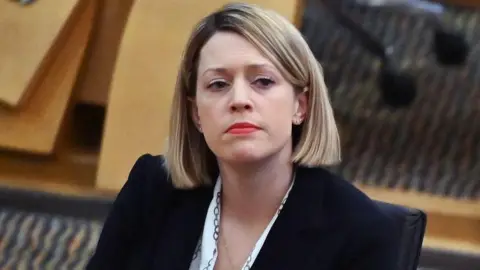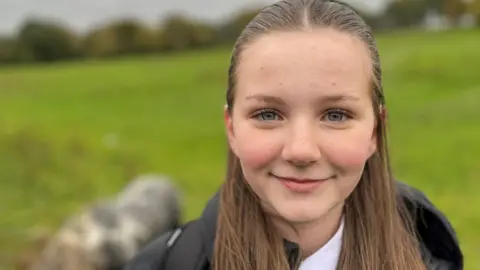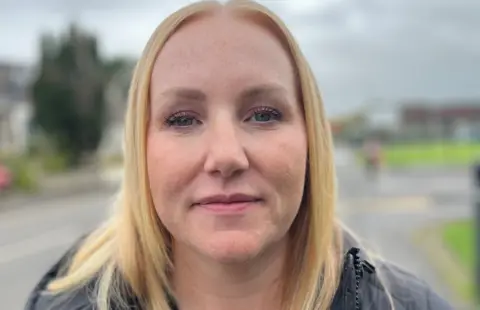Gilruth keeps £145m from councils over teacher numbers row
 Getty Images
Getty ImagesThe Scottish government has withheld £145.5m in funding to all councils because of a row over teacher numbers.
It says the money has been earmarked to maintain teacher jobs, but local government body Cosla disagrees with the ringfencing.
Most Scottish councils are looking at education cuts – including proposals to reduce learning hours, school buses, and classroom assistants - but only some, including Glasgow, have reduced teacher numbers.
Education Secretary Jenny Gilruth told BBC Scotland that she has not allowed the funding to go to councils as a result - but councils say this has forced them to make deeper cuts to other education services.
Cosla told the BBC that ringfencing spending on teachers was not the best way to protect pupil attainment and that the stalemate is making things worse.
In recent months, Ms Gilruth has warned councils that she would act if they cut teacher numbers.
Asked if she was calling councils’ bluff, Ms Gilruth told the BBC: “I have not allowed that funding to flow out the door.
“This year we tried to get to a resolution with Cosla whereby they would agree in advance to the grant conditions attached to this funding - they would agree to maintain their teacher numbers.
"Cosla refused to do that unfortunately - back in February actually.
"So since that time we’ve been working with them to try to get a mechanism whereby we can get this funding out the door. We’ve not yet been able to arrive at that".
Ms Gilruth acknowledged that this was a "challenging time for local authorities", but added: "Fundamentally, protecting teacher numbers is a really important choice I think politically to make, because it protects outcomes for our children and young people.”
Walking 50 minutes to school
One of the less high-profile cuts to school services has been to school buses.
In a bid to save £3.6m in August, North Lanarkshire changed the qualifying mileage limits for free school transport from one mile to two miles for primary school pupils, and two to three miles for secondary school pupils.
The council says it is part of £62m in cuts it needs to make over the next three years. But in some cases families feel the walking routes are dangerous, off-putting, and could lead to more pupil absences.
Leah is 12 years old and lives in Stepps. Until this August, children from Stepps could get a free school bus to Chryston High School and the walking route was deemed unacceptable.

However, North Lanarkshire Council has re-assessed the route and said it is acceptable.
Much of the 2.2-mile route is along a busy dual carriageway.
“After a tiring day at school and then to be expected to walk around 50 minutes home, no matter the weather, with terrible traffic can be a problem to some children,” says Leah.
Leah’s mother Lorraine said the route is not safe and that the local bus timetable doesn’t work with school start times either.
“I think I would support some of the council’s argument that children get the exercise before the school day, as a healthy thing – absolutely,” she said.

“But we’re talking about a 50 minute walk for most children, and some will be more than that. So the distance is part of it, but it’s the safety.
“In my opinion, it’s not a safe walking route - it’s certainly not a safe cycle route for children to maybe try and cut that time by taking a bike etc. It’s simply just not safe.”
Several councils, including Falkirk, are also looking at reducing the hours in the school week to save money.
Liane Tait has two children at primary school in Falkirk. She is concerned at the impact on children and parents.
“My children are both in primary school and the proposed cuts that they're suggesting makes them lose two and a half hours of schooling per week for the rest of their primary school and secondary school education,” she said.
“So my biggest fear is my children are going to be significantly disadvantaged to everyone else in Scotland. It just seems very inequitable and unfair that, due to financial decisions children's education going to suffer.”

However, Ms Gilruth warned that she “can and will act” to force councils to maintain classroom learning hours if they try to cut them.
Dr Sue Ellis, former professor of education at Strathclyde University, said councils are “stuck between a rock and a hard place” and that the lack of flexibility over teacher numbers from the Scottish government is not helping.
She said councils need to be given more control of their budgets because many of the less visible cuts currently happening will have the most negative impact on inequality and attainment.
“All the cuts, whether to libraries and librarians, staff classroom assistants, additional support needs, home school links teachers, all of those will impact the most on the children who are the most disadvantaged anyway,” she said.
Decisions at 'local level'
A Cosla Spokesperson said local government has consistently not supported the requirement to maintain teacher numbers set by the Scottish government and that councils were facing significant budget challenges.
They said: “Workforce decisions should be taken at a local level, dependent on local needs and circumstances.
“Measuring teacher numbers does not tell us anything about outcomes for children and young people, which is where our attention should be focused.
“Ringfencing spending on teachers forces even deeper cuts on services, including those for children with additional support needs, social work support, early intervention services, cultural services, youth work, and libraries - all of which are vital to supporting children and young people, improving attainment, and closing the poverty-related attainment gap.”
North Lanarkshire Council said its home-to-school transport criteria had been brought in line with 27 of the 32 local authorities in Scotland.
A spokesperson said: “The latest walking route assessment takes account of the most up to date information relating to the locality and supersedes an historical assessment.”
Falkirk council has deferred its decision on reducing the hours in the school week until December. It says it faces a serious financial deficit.
